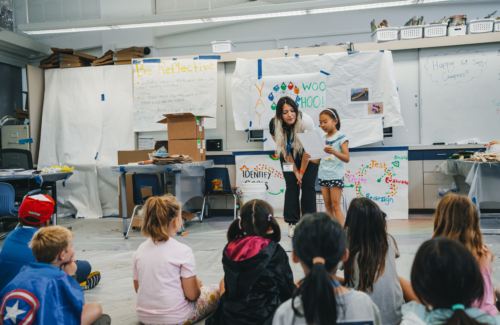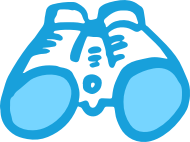Coding Summer Camps for Kids Turn Ideas Into Action

Computer science drives innovation in so many industries, including manufacturing, entertainment and medicine. It influences our home lives, with programmable doors, thermostats, light bulbs and appliances making life easier every day. Even some multi-talented celebrities, including NBA player Chris Bosh, talk show host Jimmy Fallon, actor Ashton Kutcher and supermodel Karlie Kloss count coding skills among their most valued assets. Unfortunately, experts predict that by the year 2024, there will be one million more computer science jobs than qualified workers to fill them. In terms of uncollected salaries left on the table, it’s a lot of money. In spite of this, and in spite of an increase in computer science inclusion in some classrooms, these skills continue to often not be a requirement or even an option in many schools’ curricula.
While coding is an important job skill in many fields, it is also an activity kids enjoy and one in which they can quickly develop competence. Computer code is the sequence of steps that direct a computer to execute a program or game, and anyone can learn to write it. There are a number of projects and organizations working hard to make coding more widely accessible. For example, through its Hour of Code Project, Code.org has engaged over 470 million kids worldwide in one hour of coding over the past five years. Whether your child is curious about getting started or itching to do more, there are several ways parents can help them access available resources. At-home exploration can get them started, and a coding summer camp can help them take it to the next level.
Getting Started with Coding
So how do parents support a budding code enthusiast? Here are a few ideas to help plant some seeds and grow excitement about coding:
- Check out (and we do mean literally—from your local library!) this series of graphic novels entitled, Secret Coders by Gene Luen Yang and Mike Holmes. The series follows a group of kids as they solve mysteries at school through, what else, coding! Readers learn key concepts and vocabulary, follow logic sequences and learn basic programming techniques from author and computer science teacher Yang. The books’ format is visually engaging and so much fun; they make computational thinking accessible to everyone. You can also check the graphic novels offered by Girls Who Code.
- Another low-tech way to support kids’ interest in writing code is to print or draw the arrow cards from this unplugged activity to help them program a human robot (you?) to complete a series of steps to stack cups. The commands are basic, and the activity is easy to implement, illustrating how a computer reads and executes a series of coded directions. A variety of additional activities that build on underlying concepts can help kids understand what goes on inside a computer without even using one.
- For easily digestible tutorials and online learning modules that scaffold the coding process, learners can visit Code.org. With options for pre-readers through adults, a variety of one-hour learning experiences allow users to choose their favorite game or app on which to practice coding simple sequences. A vast array of partners and contributors have made Code.org a rich resource for teachers, parents and kids.
Coding Camps Offer a Fun and Enriching Experience
Once an interest in coding is sparked, a great way to continue learning is to find a summer coding camp for kids. What video game lover hasn’t dreamed of creating their own unique game? What smartphone user hasn’t imagined a useful app that will make life easier? Depending on their age and level of experience, a variety of camp programs are available that allow kids to apply coding skills to their project ideas. Beginners will benefit from an introductory program, while those with some skills and a particular interest can find a more specialized camp. In each case, kids combine the creative aspects of the design process with the logic and critical thinking used to program applications to bring their ideas to life.
The best coding summer camps give kids a variety of authentic experiences. From articulating their vision to seeing their project come to life, they will be actively engaged. Other benefits of coding camp include:
- Hands-on learning that allows kids to play a realistic role in the design process and to learn by doing
- Mentorship with a trained teacher. Coding is a nuanced and challenging endeavor, and having a skilled, caring instructor is invaluable for kids.
- The opportunity to carry a project through from design to implementation, which is empowering and motivating
- The development of collaboration skills, as they make and receive suggestions and feedback. This interaction helps kids develop perseverance, teamwork and a greater capacity to learn from mistakes.
- Practice with logical thinking and learning how to attend to tasks with precision
- Presenting their applications showcases their accomplishments and gives kids an opportunity to reflect on the process
Summer Camp Builds Confident Coders
The adventure of a summer coding camp is one kids won’t forget. Whether they dream of life as a video game designer, mobile app developer or robot programmer, there are programs to get them started. Galileo camps help kids develop an innovative mindset and give them the skills they need to tackle challenges and bring ideas to life. In addition to a super fun week and a tremendous sense of accomplishment, the big takeaways are transferable skills for twenty-first century kids. From learning the basics of coding to focusing on a specific programming language or scripting applications, Galileo has a program for every dreamer.
For an opportunity to experience the latest technology, check out the variety of Galileo Summer Quest majors in the San Francisco, Southern California, and Chicagoland areas, as well as Summer Camps @ the Tech in the Bay Area. Sign up for our newsletter to keep up-to-date on our camp happenings and innovation resources. Or, for more information about Galileo camps, contact us here.

